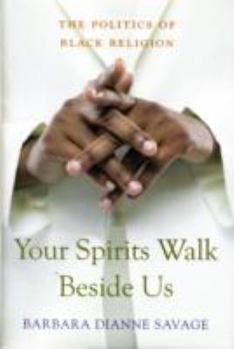Your Spirits Walk Beside Us: The Politics of Black Religion
Select Format
Select Condition 
Book Overview
Even before the emergence of the civil rights movement with black churches at its center, African American religion and progressive politics were assumed to be inextricably intertwined. In her... This description may be from another edition of this product.
Format:Hardcover
Language:English
ISBN:0674031776
ISBN13:9780674031777
Release Date:November 2008
Publisher:Belknap Press
Length:359 Pages
Weight:0.55 lbs.
Dimensions:1.2" x 5.9" x 8.4"
Customer Reviews
1 rating
Overview of important (and overlooked) figures in black religion and religious politics
Published by Thriftbooks.com User , 14 years ago
In Your Spirits Walk Beside Us, Professor Savage sets out to discuss the important history of theorizing about the practice of religion in black America while being attentive to critical thinkers and activists in black history whose rhetoric concerned the link between black social progress and the role of religious institutions. Never generalizing about the arguably ambivalent role afforded to black political movements by individual and collective religious institutions within the US, Savage nevertheless makes sure to highlight the neglected roles of intelligent black women in American religious history whose stories are lost when we acknowledge that they were not afforded the usual positions of authority occupied by black men as religious and political leaders. In addition, Savage paints a realistic and refreshing image of diverse thought within African American religion, illuminating not only the reality of diverse religious traditions but also diversity of opinion and theology within black Protestantism--attitudes about (the existence of) God, about non-Christians (namely, the forgotten black Christian fascination with Gandhi), about white religions, and about the efficacy of black pastors and churches in struggles for social equality. As ultimately revealed in the final chapter, Savage's construction of a black pantheon of sorts for meaningful, critical intellectual thought about black religion in the US serves to provide the reader a better sense of how to locate modern black leaders in a larger historical debate about the relationship between religion, race, and politics with a focus on two such men, then-presidential candidate Barack Obama and Rev. Jeremiah Wright. As the two men might be considered different ideals for the synthesis of a racial consciousness with an effective, meaningful form of black Christianity, the focus of Savage's history relies on those individuals from history who largely represent the most effective presence of black religious liberalism in American history (and rightly so, given that these women and men made and preserved the black institutions responsible for progress). While attention is given to the reality of a conservative, individualistic, affluent tide in black religion evidenced by modern megachurches, I do feel that such conservative positioning and history needs to be given stronger attention in order to highlight for an audience interested in the intersection of religion and politics how race colors differently the simplistic liberal/conservative divide so easily stereotyped in modern political discourse. But the author's best work remains her ability to make sure that any modern discussion about religion, race, and politics is sensitive to the history of gendered divisions within black social history. Perhaps a more robust discussion of the political divides between black women in religious institutions would complicate Savage's important response to the minimization of black women in African A




